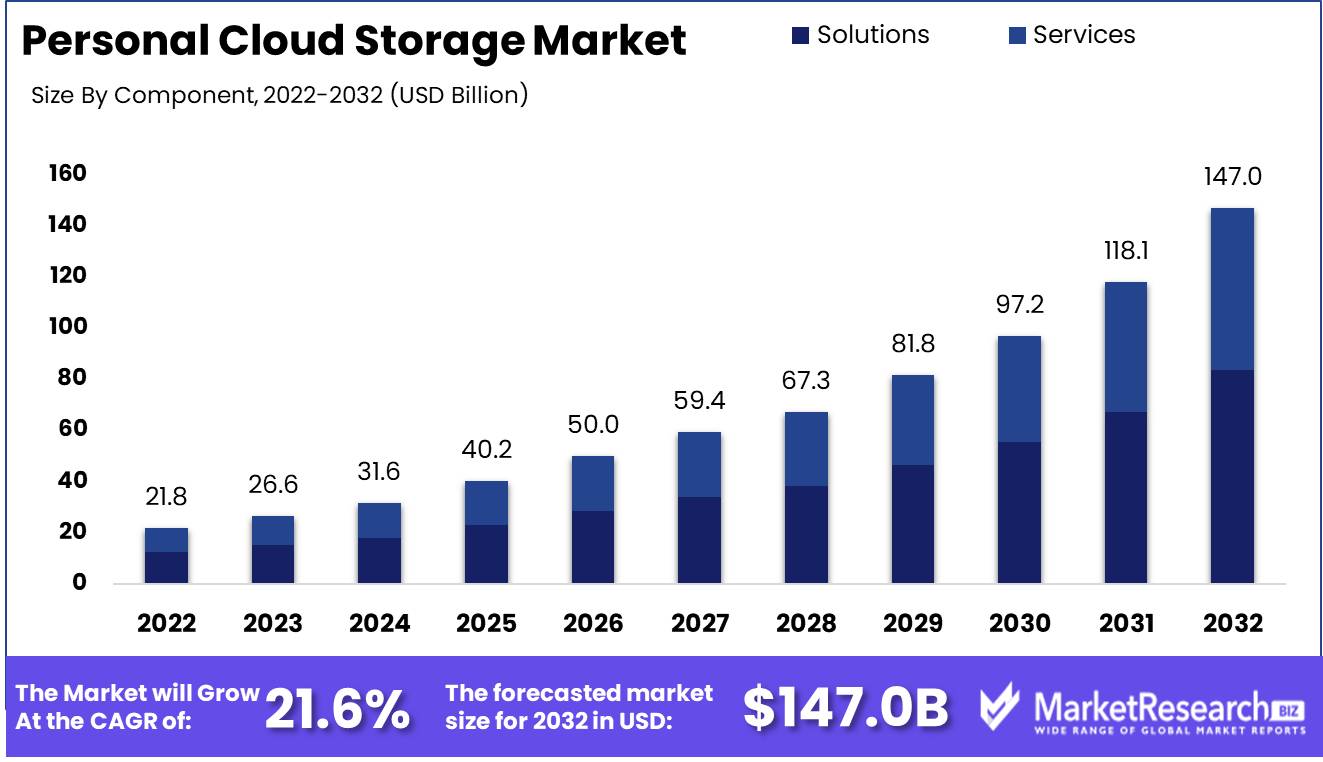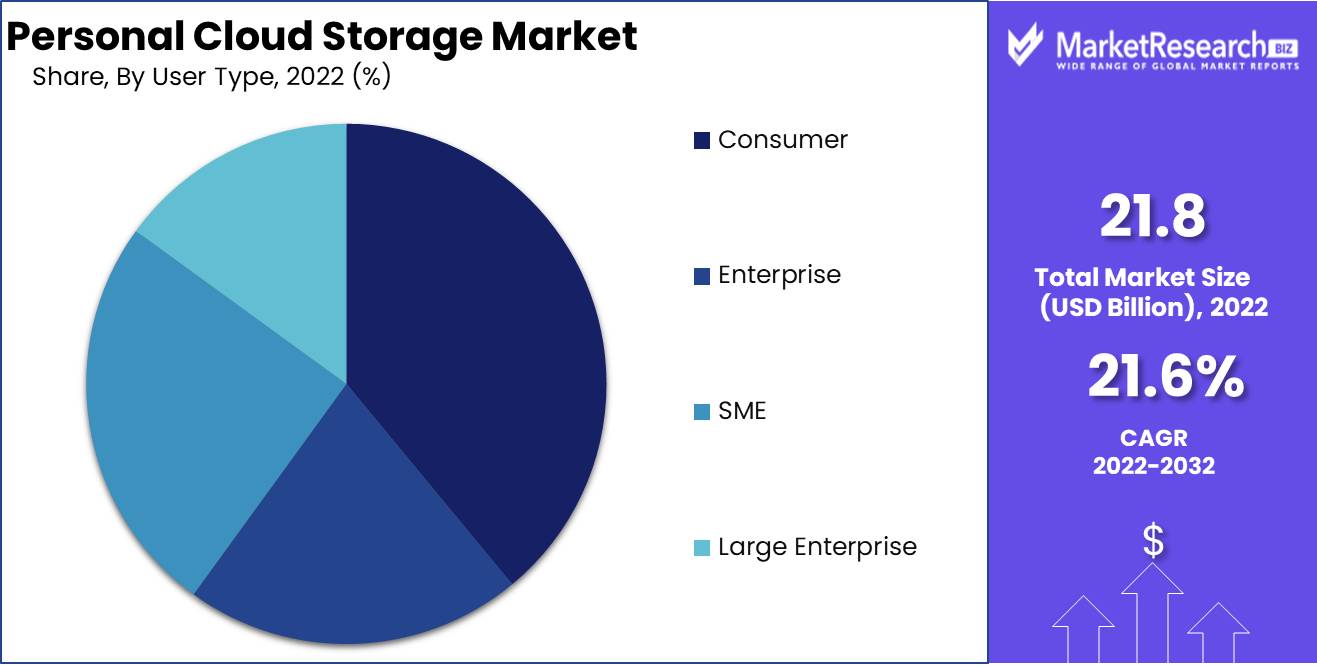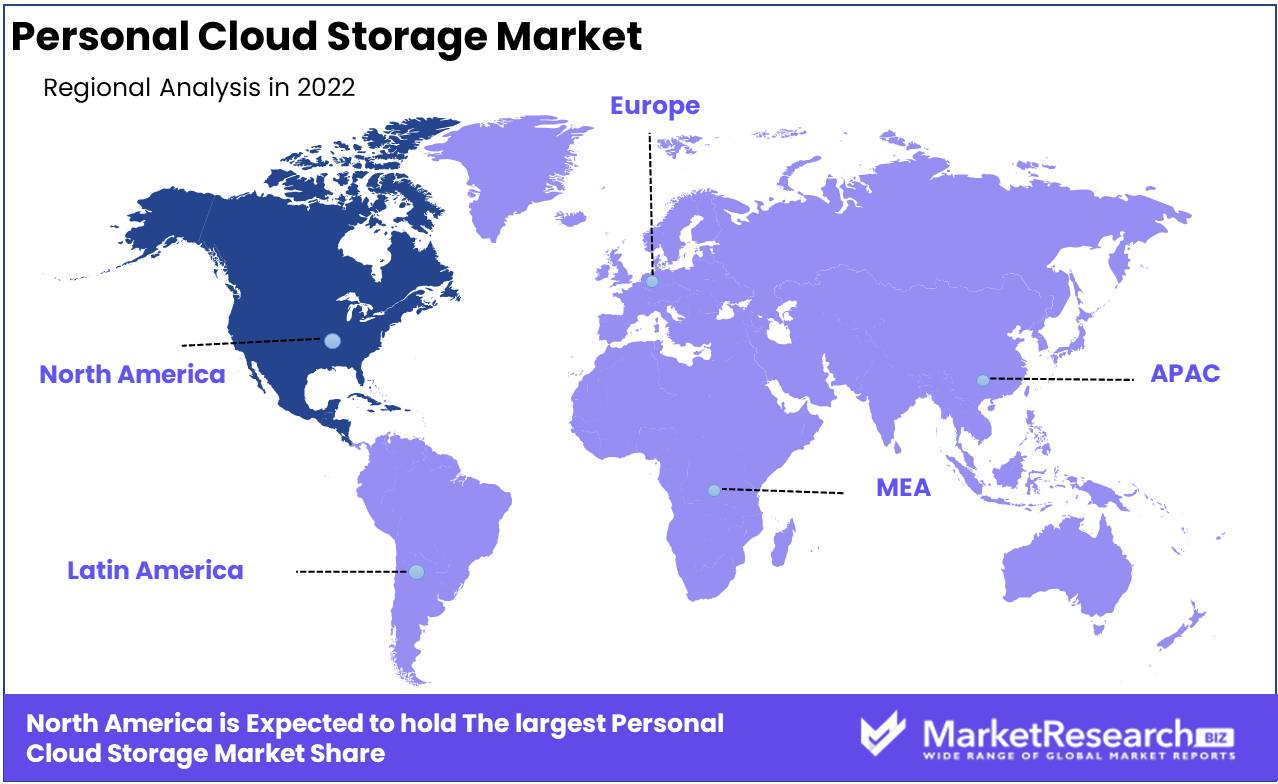
Personal Cloud Storage Market By Component (Solutions, Services), By User Type (Consumer, Enterprise, SME, Other), By Application (Primary Storage, Archiving, Other), By Region And Companies - Industry Segment Outlook, Market Assessment, Competition Scenario, Trends, And Forecast 2023-2032
-
39700
-
July 2023
-
170
-
-
This report was compiled by Correspondence Linkedin | Detailed Market research Methodology Our methodology involves a mix of primary research, including interviews with leading mental health experts, and secondary research from reputable medical journals and databases. View Detailed Methodology Page
-
Report Overview
Personal Cloud Storage Market size is expected to be worth around USD 147.0 Bn by 2032 from USD 21.8 Bn in 2022, growing at a CAGR of 21.6% during the forecast period from 2023 to 2032.
The personal cloud storage market, cloud storage providers, and their entrancing services enable individuals to store, manage, and access their precious personal data via the vast expanse of the Internet. Dear reader, the raison d'être of personal cloud storage is to provide users with a sanctuary of security, expediency, and dependability for their most valuable files and data.

The importance of the personal cloud storage market cannot be overstated. In a tumultuous era where data breaches and the loss of personal information loom menacingly, the need for a sanctuary of secure and dependable storage has become an insurmountable requirement. Personal cloud storage is superior to conventional storage methods, such as mundane hard drives and physical storage devices, due to its numerous advantages.
The personal cloud storage market grants users the enchanted ability to access their cherished data from anywhere in the world, so long as they have a magical internet connection. Users can effortlessly retrieve their cherished files, photographs, or videos regardless of whether they are using a majestic computer, a captivating smartphone, or a spellbinding tablet, even when they are traveling through unknown realms. This marvelous convenience eliminates the need to transport mundane physical storage devices and ensures that data treasures are always accessible.
The combination of artificial intelligence (AI) and machine learning (ML) has imbued user experience with enchantment. These ethereal technologies have the extraordinary capacity to navigate the labyrinthine corridors of data usage patterns, preferences, and behaviors, beloved reader. As part of their mission to elevate the user experience to previously unimaginable realms, they reveal concealed secrets and whisper sweet personal recommendations into the ears of their users.
The personal cloud storage market reaches far beyond the confines of technology titans. Industries of all sizes, from the magnificent realm of banks and financial institutions to the enchanting realm of media and entertainment, have caught a glimpse of the gleaming potential within. The astute bankers have sought refuge in the cloud, integrating secure document storage into their vast service networks. Thus, users may be enraptured by the knowledge that their cherished financial documents, bank statements, and investment records are shielded from prying eyes and the chaotic vagaries of the mortal realm within the sanctified realms of the personal cloud.
Driving factors
Expansive Growth Individual Cloud Storage Explodes
The development of the market for personal cloud storage has been exponential in recent years, with the majority of the growth occurring in the United States. Individuals, particularly those living in the digital age, generate immense quantities of data via multiple sources, including smartphones, tablets, laptops, and wearable devices. This data consists of irreplaceable memories in the form of photographs, recordings, and documents, as well as vital personal and professional information.
Mobile Devices Drive Demand for Cloud Storage
The pervasive adoption of mobile devices, such as smartphones and tablets, has transformed our access to and sharing of information. Due to the accelerated development of technology, these devices have become an integral part of our daily lives, allowing us to remain connected and productive while on the go. As mobile devices become more potent and storage capacities increase, users increasingly rely on personal cloud storage solutions to store and access their data easily.
The Need for Personal Cloud Storage and Remote Access
In today's fast-paced society, remote file access is no longer a luxury but rather a necessity. Whether it's for work or play, you can count on us to help you out. This demand has fuelled the expansion of the personal cloud storage market, as these solutions provide seamless remote access to files, eliminating the need for physical storage devices and decreasing the risk of data loss.
Data Security Private Cloud Storage Adapts
The prevalence of data breaches and other security risks has led to an increase in the number of people who are willing to pay for them. To engender confidence in users, the personal cloud storage market has prioritized robust security measures, such as encryption, two-factor authentication, and stringent data protection protocols.
Multimedia Explosion Fuels Market for Cloud Storage
The increasing prevalence of multimedia content, such as photos, videos, and music, has had a significant impact on the personal cloud storage market. Individuals now possess immense libraries of multimedia files, which necessitate voluminous storage space and seamless access across multiple devices. Personal cloud storage solutions meet this expanding demand by providing ample storage capacities and intuitive interfaces designed for media management.
Restraining Factors
Limited Storage Limits Cloud Adoption by Individuals
The limited storage capacity of free cloud storage plans is one of the main factors restraining the personal cloud storage market. Numerous individuals and organizations rely on personal cloud storage services to remotely store and access their data. However, free plans typically come with limited storage space, which can be inconvenient for users who need to store a substantial quantity of data.
Competition Fuels Cloud Storage Innovation
With so many options available, users have the privilege of choosing their personal cloud storage market provider with discretion. Before making a decision, they can compare features, storage capacities, pricing, and security measures. This increased competition exerts pressure on service providers to continuously enhance their offerings and distinguish themselves from the competition. It also means that providers must invest heavily in marketing and advertising to guarantee their visibility and attract new clients.
Internet Connectivity Is the Primary Obstacle to Cloud Adoption
The reliance on internet connectivity is a significant factor preventing the widespread adoption of personal cloud storage. Personal cloud storage market services function by storing data on remote, Internet-accessible servers. This means that users must have a robust and reliable internet connection in order to access their cloud-stored files and data.
Component Analysis
Recent years have seen substantial growth in the personal cloud storage market, with the solutions segment dominating. File syncing, data backup, and online collaboration are just a few of the solutions provided by this segment. The increasing demand for these solutions can be attributed to mobile device proliferation and the requirement for effective data management.
Economic development drives developing economy solution adoption. Rapid urbanization and growth in these economies are increasing the number of businesses and individuals who need efficient data storage and management solutions. The cost-effectiveness of the solution, as well as the ease with which it can be implemented, makes it an attractive alternative for anyone looking to purchase a home.
Solutions will expand fastest in the personal cloud storage market. This is owing to the increasing requirement for efficient data management solutions across industries. Due to its flexibility, scalability, and cost-effectiveness, businesses are increasingly relying on cloud storage to store and manage their data. The rapid advancements in technology, such as artificial intelligence and machine learning, are expected to drive demand for the solutions segment.
User Type Analysis
The consumer segment dominates the personal cloud storage market. The use of smartphones and tablets as well as the necessity for a secure data storage system have led to the development of a new generation of data storage devices.
Like the solutions segment, rising economies have driven consumer segment adoption. The number of individuals who own personal devices is increasing in these economies. These individuals want convenient and secure personal data storage solutions, making the consumer segment appealing.
Consumer habits and behavior have also played a crucial impact in consumer segment dominance in the personal cloud storage market. Personal data has increased due to the increasing use of personal gadgets for communication, leisure, and business. Consumers want simple and secure storage solutions to back up and access their personal data anywhere.

Application Analysis
The primary storage segment dominates the personal cloud storage market, offering businesses and individuals a variety of storage solutions. This segment serves enterprise data storage, media and entertainment, healthcare, and e-commerce applications.
The growth of the economy has led to a rise in the number of people who are using the internet to purchase goods and services. Businesses in these economies are increasingly using primary storage solutions to store and manage their data. This is true for industries like e-commerce and healthcare, where data volume and complexity are increasing.
The primary storage segment's personal cloud storage market dominance is also due to consumer trends and behavior. Media streaming, online gaming, and social media applications generate and consume massive amounts of data. The only way to get a good deal on a new car is to buy a used one.
Key Market Segments
By Component
- Solutions
- Services
By User Type
- Consumer
- Enterprise
- SME
- Large Enterprise
By Application
- Primary Storage
- Backup and Disaster Recovery
- Archiving
Growth Opportunity
Accessing IoT
The integration of the personal cloud storage market with IoT devices and smart home systems offers enormous growth potential. The use of a personal computer to access the Internet of Things (IoT) and the Internet of Things (IoT) is a growing trend. This integration gives users unrivaled ease and accessibility thanks to IoT's growing popularity. Personal cloud storage providers can work with IoT device manufacturers to offer seamless data synchronization and real-time backups, enhancing user experience and market position.
Untapped Markets
In developed nations, personal cloud storage has grown rapidly. Emerging markets have tremendous potential. Due to their vast populations, expanding internet penetration, and smartphone use, emerging nations like India, Brazil, and Indonesia offer attractive potential. The best way to get the word out about your company's new product is to use it as a marketing tool. Language support and local content preferences help boost market penetration in these locations.
Customizing Empowers Users
The ability to customize a product's packaging is a key selling point for the company. Providers can differentiate themselves from their rivals by letting users customize their storage plans, security settings, and user interfaces. The use of a computer program to calculate a person's calorie intake is a common practice in the United States. Personal cloud storage providers should continuously research and develop to offer a wide range of customization capabilities and ensure their services meet users' individual needs.
Collaboration Opportunities
Collaborations between personal cloud storage market providers and software/device manufacturers offer growth potential. Cloud providers may increase their reach and draw in new users by directly integrating their cloud services into software and devices. Photo editing software providers can help personal cloud storage systems store and edit photos. Partnering with smartphone manufacturers to pre-install personal cloud storage apps can also increase customers. It's a win-win situation for everyone involved.
Cross-Platform Compatibility That Is Seamless
Personal cloud storage market providers must make their services compatible with a wide range of devices, including smartphones, tablets, PCs, and laptops, regardless of operating system. The ability to create a seamless user experience across all platforms is provided by the usage of cloud computing, which is why we recommend that you adopt it. This increases user convenience, utilization, and loyalty.
Latest Trends
Secure Encryption
The use of a personal computer to access the Internet of Things (IoT) is becoming more and more common. Even with unwanted access, encryption keeps data secure. Today's users want strong encryption to safeguard their data from cyberattacks and privacy breaches. The best way to start a business is to start with a solid foundation. These services reassure users that their important files, documents, and media are safe by prioritizing data protection.
Intelligent Cloud Storage
AI integration is transforming personal cloud storage by improving file management and user experiences. Automating digital asset organization saves users time and effort. AI-powered personal cloud storage solutions can also identify and mitigate security threats. These systems can detect anomalies and risks by studying user behavior, data trends, and network traffic, improving data safety for users.
Affordable Subscriptions
In the personal cloud storage market, subscription-based models provide users with flexible and affordable storage alternatives. One-time payment solutions often include restrictions or require users to manage hardware and infrastructure. Subscription-based models allow users to use scalable, on-demand storage, pay according to their needs, and receive updates, maintenance, and support. This technique democratizes high-quality personal cloud storage services, allowing individuals and enterprises of all sizes to enjoy secure and reliable data storage without major upfront commitments.
Cloud Performance and Accessibility
Hybrid cloud storage integrates on-premises infrastructure with public or private cloud storage. By using hybrid cloud solutions, users can store frequently accessed data locally for quick retrieval and use the cloud for backup and additional storage. Hybrid deployments allow users to securely access their files from anywhere, anytime while retaining control over their most important data.
Seamless Integration Improves Productivity
Personal cloud storage market providers are integrating productivity and collaboration capabilities to meet the changing needs of users. This integration lets users manage and share files in familiar contexts without manual transfers, enhancing productivity. By integrating personal cloud storage into popular productivity suites and collaboration platforms, users can easily synchronize and collaborate on files, speeding workflows and improving team collaboration.
Regional Analysis
The North America Region Dominates the Personal Cloud Storage Market. Our data management and sharing have changed thanks to the ability to securely store and access files, photographs, and movies from any device. North America dominates the personal cloud storage market, strengthening its position as a global leader as demand for this innovative service grows.
Over the past few years, greater internet penetration, the proliferation of smartphones and other connected devices, and the growing need for data storage solutions have driven the North American personal cloud storage market. Due to the continuous growth of digital content, both personal and professional, individuals and businesses are looking for secure and dependable ways to store and access their data.
The ability to store and retrieve data from a variety of sources is a significant benefit of the cloud-based model. The use of a web interface, a mobile app, or a combination of both is common practice in the United States. This flexibility benefits professionals who travel or work remotely. Users will have peace of mind because it eliminates the need for physical storage devices and decreases the danger of data loss or theft.
The United States of America's largest city, Chicago, is home to the world's busiest airports. The region has become a magnet for digital innovation because of modern data centers, high-speed internet, and the presence of well-known IT enterprises. The ability to offer a wide range of services to consumers is a hallmark of the company's success.
The presence of well-established market companies and their ongoing attempts to innovate and meet users' changing needs also contribute to North America's personal cloud storage market supremacy. These companies invest extensively in R&D to improve their services and stay ahead of the curve. They provide the best value for customers by offering reasonable prices, large storage capabilities, and new features.

Key Regions and Countries
North America
- US
- Canada
- Mexico
Western Europe
- Germany
- France
- The UK
- Spain
- Italy
- Portugal
- Ireland
- Austria
- Switzerland
- Benelux
- Nordic
- Rest of Western Europe
Eastern Europe
- Russia
- Poland
- The Czech Republic
- Greece
- Rest of Eastern Europe
APAC
- China
- Japan
- South Korea
- India
- Australia & New Zealand
- Indonesia
- Malaysia
- Philippines
- Singapore
- Thailand
- Vietnam
- Rest of APAC
Latin America
- Brazil
- Colombia
- Chile
- Argentina
- Costa Rica
- Rest of Latin America
Middle East & Africa
- Algeria
- Egypt
- Israel
- Kuwait
- Nigeria
- Saudi Arabia
- South Africa
- Turkey
- United Arab Emirates
- Rest of MEA
Key Players Analysis
These services' ease, security, and accessibility have boosted the personal cloud storage market. This essay will examine how Akamai Technologies, Microsoft, IBM, Edgio, Google, and AWS (Amazon Web Services) have dominated this profitable market.
Akamai Technologies, a renowned content delivery platform, offers advanced personal cloud storage. Akamai delivers content quickly and reliably across devices with its robust infrastructure and global network. Businesses and individuals with large data storage needs prefer their cloud storage services because of their security, scalability, and performance.
Microsoft excels in personal cloud storage. Microsoft has simplified cloud storage for millions of users with OneDrive. OneDrive improves cooperation and productivity by integrating with Microsoft Office and other productivity applications. They dominate the personal cloud storage market because of enhanced security and a user-friendly UI.
IBM dominates the personal cloud storage market as well. IBM Cloud Storage focuses on enterprise storage. IBM ensures data integrity, scalability, and business continuity with superior data encryption, tiered storage, and hybrid cloud. Their tailored approach to enterprise storage difficulties has made them a market leader.
Edgio, a new participant in the personal cloud storage market, has acquired popularity with its unique features and user-centric approach. The ability to store, access, and distribute data in a secure manner is a key component of the Edifice. Edgio is portraying itself as a trustworthy industry option by emphasizing privacy and data control.
Google excels in several areas, including cloud storage. Google Drive, their personal cloud storage, combines with other Google services to give users a seamless experience. Google Drive meets personal and professional storage and collaboration needs. Users worldwide can rely on Google's infrastructure.
Top Key Players in Personal Cloud Storage Market
- Akamai Technologies (U.S.)
- Microsoft (U.S.)
- IBM (U.S.)
- Edgio (U.S.)
- Google (U.S.)
- AWS (U.S.)
- Amazon Web Services, Inc. (U.S.)
- Hewlett Packard Enterprise Development LP (U.S.)
- Oracle (U.S.)
- RACKSPACE TECHNOLOGY (U.S.)
- Dell Inc (U.S.)
- Huawei Technologies Co., Ltd (China)
- Fujitsu (Japan)
- Hitachi Vantara LLC (U.S.)
- ASUS Open Cloud (Taiwan)
- Citrix Systems, Inc. (U.S.)
- Alibaba Cloud (China)
- VMware, Inc (U.S.)
- Buffalo (Japan)
- Seagate Technology LLC (U.S.)
- NetApp (U.S.)
- Tencent Cloud (China)
Recent Development
- In 2023, Dropbox made waves with the announcement of its Dropbox Family plan, designed to meet the growing requirements of families.
- In 2022, Google One introduced a game-changing product for individuals seeking inexpensive storage expansion.
- In 2021, Microsoft will release a new version of its flagship product, Microsoft OneDrive, which will allow users to store their data in the cloud.
- In 2020, Amazon Photos made a brave move to revolutionize the landscape of personal cloud storage by launching an unlimited storage plan for Prime members only.
- In 2019, Apple iCloud, a pioneer in the domain of cloud storage, enhanced its existing suite of plans.
Report Scope
Report Features Description Market Value (2022) USD 21.8 Bn Forecast Revenue (2032) USD 147.3 Bn CAGR (2023-2032) 21.60% Base Year for Estimation 2022 Historic Period 2016-2022 Forecast Period 2023-2032 Report Coverage Revenue Forecast, Market Dynamics, COVID-19 Impact, Competitive Landscape, Recent Developments Segments Covered By Component (Solutions, Services), By User Type (Consumer, Enterprise, SME, Large Enterprise), By Application (Primary Storage, Backup and Disaster Recovery, Archiving) Regional Analysis North America – The US, Canada, & Mexico; Western Europe – Germany, France, The UK, Spain, Italy, Portugal, Ireland, Austria, Switzerland, Benelux, Nordic, & Rest of Western Europe; Eastern Europe – Russia, Poland, The Czech Republic, Greece, & Rest of Eastern Europe; APAC – China, Japan, South Korea, India, Australia & New Zealand, Indonesia, Malaysia, Philippines, Singapore, Thailand, Vietnam, & Rest of APAC; Latin America – Brazil, Colombia, Chile, Argentina, Costa Rica, & Rest of Latin America; Middle East & Africa – Algeria, Egypt, Israel, Kuwait, Nigeria, Saudi Arabia, South Africa, Turkey, United Arab Emirates, & Rest of MEA Competitive Landscape Akamai Technologies (U.S.), Microsoft (U.S.), IBM (U.S.), Edgio (U.S.), Google (U.S.), AWS (U.S.), Amazon Web Services, Inc. (U.S.), Hewlett Packard Enterprise Development LP (U.S.), Oracle (U.S.), RACKSPACE TECHNOLOGY (U.S.), Dell Inc (U.S.), Huawei Technologies Co., Ltd (China), Fujitsu (Japan), Hitachi Vantara LLC (U.S.), ASUS Open Cloud (Taiwan), Citrix Systems, Inc. (U.S.), Alibaba Cloud (China), VMware, Inc (U.S.), Buffalo (Japan), Seagate Technology LLC (U.S.), NetApp (U.S.), Tencent Cloud (China) Customization Scope Customization for segments, region/country-level will be provided. Moreover, additional customization can be done based on the requirements. Purchase Options We have three licenses to opt for: Single User License, Multi-User License (Up to 5 Users), Corporate Use License (Unlimited User and Printable PDF) -
-
- Akamai Technologies (U.S.)
- Microsoft (U.S.)
- IBM (U.S.)
- Edgio (U.S.)
- Google (U.S.)
- AWS (U.S.)
- Amazon Web Services, Inc. (U.S.)
- Hewlett Packard Enterprise Development LP (U.S.)
- Oracle (U.S.)
- RACKSPACE TECHNOLOGY (U.S.)
- Dell Inc (U.S.)
- Huawei Technologies Co., Ltd (China)
- Fujitsu (Japan)
- Hitachi Vantara LLC (U.S.)
- ASUS Open Cloud (Taiwan)
- Citrix Systems, Inc. (U.S.)
- Alibaba Cloud (China)
- VMware, Inc (U.S.)
- Buffalo (Japan)
- Seagate Technology LLC (U.S.)
- NetApp (U.S.)
- Tencent Cloud (China)




